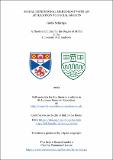Files in this item
Modal extensional mereology with an application to social groups
Item metadata
| dc.contributor.advisor | Cotnoir, A. J. | |
| dc.contributor.advisor | Russell, Gillian | |
| dc.contributor.author | Schirripa, Giulia | |
| dc.coverage.spatial | 107 | en_US |
| dc.date.accessioned | 2023-02-24T09:48:04Z | |
| dc.date.available | 2023-02-24T09:48:04Z | |
| dc.date.issued | 2023-06-12 | |
| dc.identifier.uri | https://hdl.handle.net/10023/27047 | |
| dc.description.abstract | How does Classical Extensional Mereology (CEM) interact with time and modality? In its first-order logical setting, CEM does not have the formal tools to deal with these dimensions. Nonetheless, it is often charged with endorsing controversial metaphysical theses like mereological essentialism and mereological constantism. Allowing CEM to interact with quantified modal logic (QML) without adding any further mereological commitment clarifies which modal theorems CEM actually implies and eventually undercuts wrong-headed allegations against it. From the logical side, I endorse system KTB of modal logic with constant domain semantics, but several theorems are also provable with the adoption of weaker logics (like KT and even the simplest K). We will also be able to successfully simulate variable domain semantics via the procedure of existential relativisation. From the mereological side, I necessitate the ordering axioms and the strong-supplementation axiom, leaving the door open for four different alternatives to deal with the axiom of unrestricted composition. The mereological results emerging from this setting include the necessity of extensionality principles – which does not lead to mereological essentialism – and the existence of possible fusions even when an actualist version of unrestricted composition is adopted. In the final part of the thesis, I apply the main findings of modal extensional mereology to group membership. After showing why some standard objections are misguided, I argue that the standard account of social groups based on CEM fails to be satisfactory because it conceives group membership as just parthood. My proposal is to regard group membership as φ-parthood instead. Under this new account, social groups are not just mereological wholes, but mereological wholes with a specified understanding of the parthood relation. Endorsing this novel account allows us to retain an account of social groups based on CEM while avoiding the knockdown objections faced by the standard one. | en_US |
| dc.language.iso | en | en_US |
| dc.rights | Creative Commons Attribution-NonCommercial-NoDerivatives 4.0 International | * |
| dc.rights.uri | http://creativecommons.org/licenses/by-nc-nd/4.0/ | * |
| dc.subject | Classical extensional mereology | en_US |
| dc.subject | Modal mereology | en_US |
| dc.subject | Social groups | en_US |
| dc.subject | Social ontology | en_US |
| dc.subject.lcc | BD396.S3 | |
| dc.subject.lcsh | Whole and parts (Philosophy) | en |
| dc.subject.lcsh | Social groups--Philosophy | en |
| dc.title | Modal extensional mereology with an application to social groups | en_US |
| dc.type | Thesis | en_US |
| dc.type.qualificationlevel | Masters | en_US |
| dc.type.qualificationname | MPhil Master of Philosophy | en_US |
| dc.publisher.institution | The University of St Andrews | en_US |
| dc.publisher.department | University of Stirling | en_US |
| dc.identifier.doi | https://doi.org/10.17630/sta/296 |
The following licence files are associated with this item:
This item appears in the following Collection(s)
Except where otherwise noted within the work, this item's licence for re-use is described as Creative Commons Attribution-NonCommercial-NoDerivatives 4.0 International
Items in the St Andrews Research Repository are protected by copyright, with all rights reserved, unless otherwise indicated.


